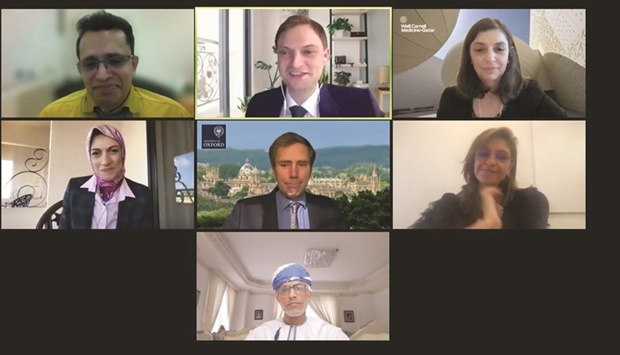The ethical and legal issues related to care for older people were explored at the latest instalment of Weill Cornell Medicine-Qatar’s (WCM-Q) Intersection of Law & Medicine series.
Convening online, a panel of expert speakers discussed international best practices on protecting and enhancing the care and wellbeing of older persons, and the current legal and policy approaches concerning the care of older persons in the Middle East. They also identified shortcomings in the provision of care for older people within existing frameworks, and outlined strategies for improving the wellbeing of older people in Qatar.
The event featured as expert speakers Dr Thurayya Arayssi, professor of clinical medicine & vice-dean for academic and curricular affairs at WCM-Q; Dr Barry Solaiman, assistant professor of law at the College of Law at HBKU; Dr Hamed al-Sinawi, senior consultant old age psychiatrist at Sultan Qaboos University Hospital in Oman; Dr Suzanne Hammad, an independent research consultant adjunct professor at Northwestern University in Qatar and Georgetown University in Qatar; Dr Jonathan Herring, professor of law at Oxford University; Dr Shereen Hussein, professor of health and social care policy at the Department of Health Services Research and Policy at the London School of Hygiene & Tropical Medicine; and Dr Mani Chandran, who spoke on behalf of Dr Hanadi al-Hamad, chair of the geriatrics and long-term care department at Hamad Medical Corporation (HMC) and clinical associate professor in the College of Medicine at Qatar University.
Dr Hammad’s presentation discussed the provision of care for older people and people with dementia in the Gulf region, noting many positives, such as well-developed welfare services, good support for caregivers, and vibrant culture of NGOs advocating for older persons’ care. However, she also noted that drawbacks included occasionally haphazard implementation of care policies, gender biases, problems addressing care outside of the family sphere, and poor regulation of domestic caregivers.
Dr Chandran, senior consultant geriatric psychiatrist at HMC and a member of the Qatar National Dementia Plan Task Force, said that Qatar is the first Arab nation to have a national dementia plan. The Qatar National Dementia Plan, he explained, has seven work areas: Dementia is one of the priorities of public health; awareness of dementia and understanding it; reducing the risks of dementia; diagnosis of dementia, its treatment, the health care and support; supporting the caregivers of the people with dementia; dementia information systems; dementia-related research and innovation. Regarding the legal position of people with dementia, Dr Chandran also touched upon stigma and how it can impede provision of care for adults with dementia, and the issue of mental capacity in relation to financial decision-making.
The event featured as expert speakers Dr Thurayya Arayssi, professor of clinical medicine & vice-dean for academic and curricular affairs at WCM-Q; Dr Barry Solaiman, assistant professor of law at the College of Law at HBKU; Dr Hamed al-Sinawi, senior consultant old age psychiatrist at Sultan Qaboos University Hospital in Oman; Dr Suzanne Hammad, an independent research consultant adjunct professor at Northwestern University in Qatar and Georgetown University in Qatar; Dr Jonathan Herring, professor of law at Oxford University; Dr Shereen Hussein, professor of health and social care policy at the Department of Health Services Research and Policy at the London School of Hygiene & Tropical Medicine; and Dr Mani Chandran, who spoke on behalf of Dr Hanadi al-Hamad, chair of the geriatrics and long-term care department at Hamad Medical Corporation (HMC) and clinical associate professor in the College of Medicine at Qatar University.
Dr Hammad’s presentation discussed the provision of care for older people and people with dementia in the Gulf region, noting many positives, such as well-developed welfare services, good support for caregivers, and vibrant culture of NGOs advocating for older persons’ care. However, she also noted that drawbacks included occasionally haphazard implementation of care policies, gender biases, problems addressing care outside of the family sphere, and poor regulation of domestic caregivers.
Dr Chandran, senior consultant geriatric psychiatrist at HMC and a member of the Qatar National Dementia Plan Task Force, said that Qatar is the first Arab nation to have a national dementia plan. The Qatar National Dementia Plan, he explained, has seven work areas: Dementia is one of the priorities of public health; awareness of dementia and understanding it; reducing the risks of dementia; diagnosis of dementia, its treatment, the health care and support; supporting the caregivers of the people with dementia; dementia information systems; dementia-related research and innovation. Regarding the legal position of people with dementia, Dr Chandran also touched upon stigma and how it can impede provision of care for adults with dementia, and the issue of mental capacity in relation to financial decision-making.

